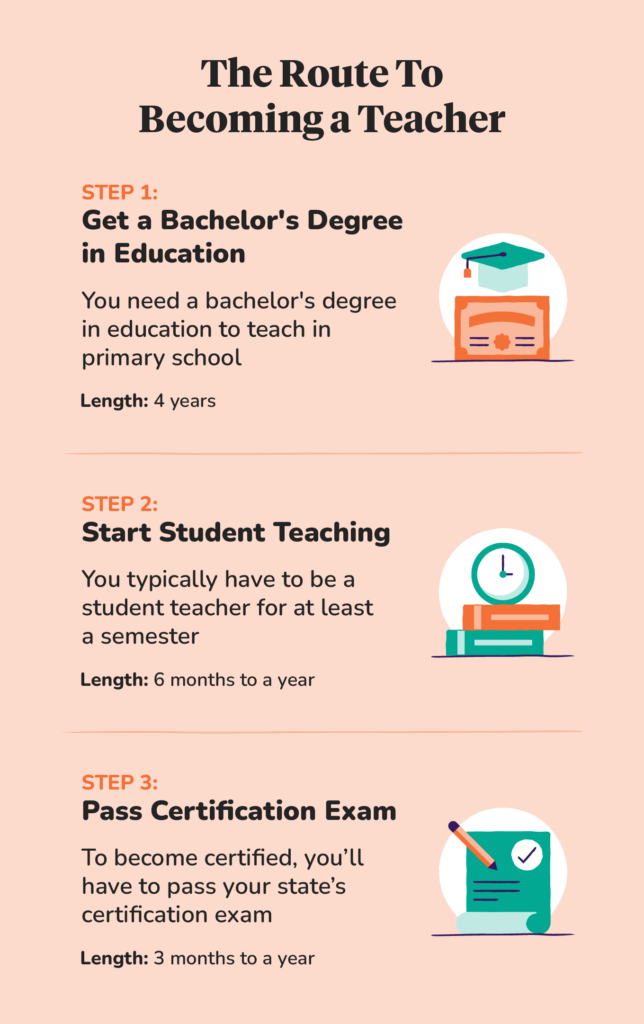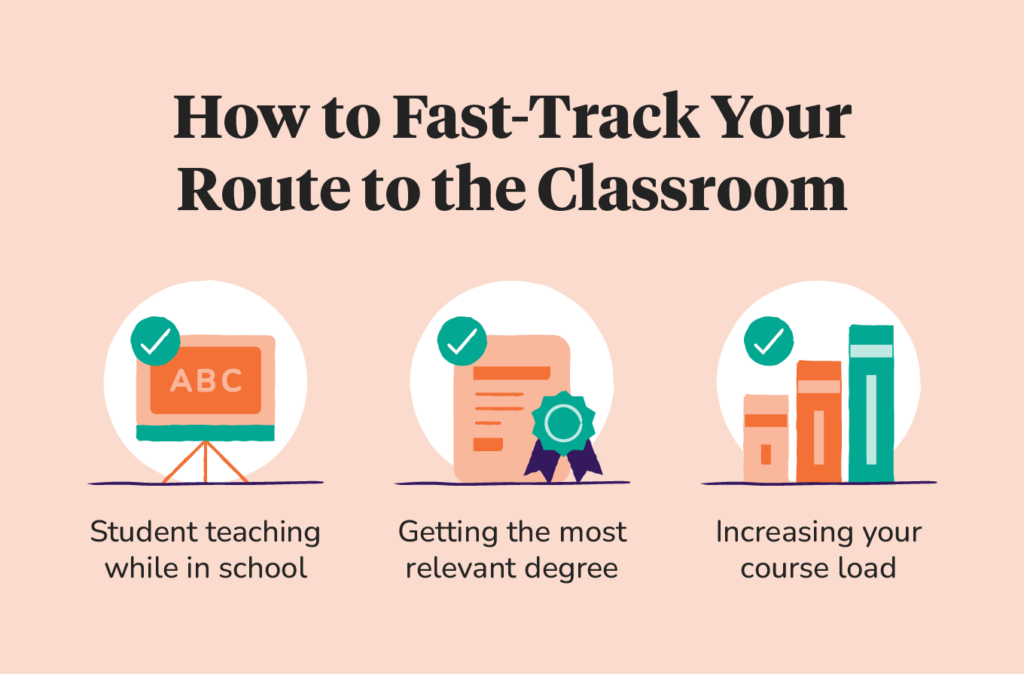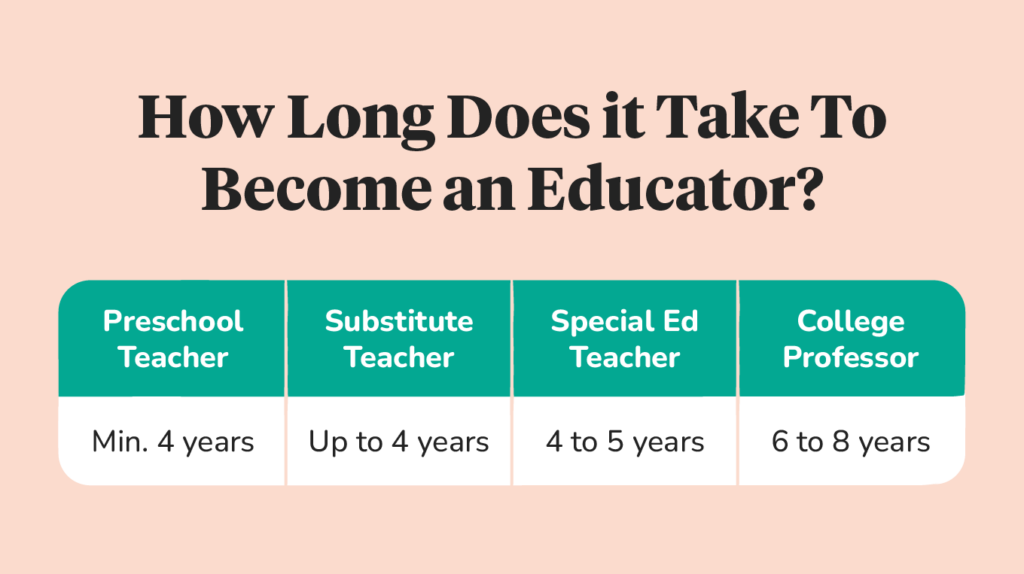How Long Does It Take To Become a Teacher? [Timeline]

|
While each state has different requirements, you can typically become a teacher in four to five years |
We all remember our favorite teachers in elementary and middle school. While they may have seemed wise beyond their years, many of them were likely only a few years out of college — meaning that once you you earn a bachelor’s degree in education, you’re not far off from becoming a teacher. If you think being a teacher is the right career path, you’ll be able to become one shortly after getting your bachelor’s degree in education.
You’re required to have a bachelor’s degree to teach in public schools, but once you graduate college, you can quickly start the process of becoming certified to teach in your preferred state. The process typically involves completing a certain number of student teaching hours and then passing your state teacher certification exam.
While the full journey to becoming a teacher typically takes four to five years, there are a few ways an aspiring educator can speed up their timeline. In this post, we’ll explore how long it takes to become a teacher, what to expect at each step in the journey, and how to fast-track the process.

Step 1: Get a Bachelor’s Degree in Education
The brunt of the time it takes to become a teacher is earning your bachelor’s degree in education — generally totaling four years (or eight semesters). While you work toward your degree, there are ways you can expedite your path to the classroom. This includes:

Student Teaching While in School
In almost every state, you’ll need to log a certain amount of classroom hours as a student teacher before becoming a full-time teacher. However, you can complete some of these hours while you work towards your degree in education — so they’re already behind you when you graduate.
Getting the Most Relevant Degree
You can avoid getting a master’s degree or enrolling in an alternative teaching certification program if you obtain a degree relevant to what you’ll be teaching. For primary school teachers, you’ll pursue a bachelor’s degree in education. But if you want to teach preschool, you’ll likely pursue a degree in early childhood education.
Future middle and high school teachers will likely work towards a degree in a specialized content area, like:
- Biology
- Mathematics
- English
- History
Increasing Your Course Load
The traditional path to securing your bachelor’s degree takes four years, but you can do it faster. A normal course load for a full-time education student is typically 12 hours per week; however, you can increase that during certain semesters with the hopes of graduating in three years — making you a certified teacher in four.
If you increase your course load, it may be more difficult to work towards other teaching requirements — like logging student teaching hours or studying for state certification exams — at the same time. In some cases, it may make more sense to take a normal course load while student teaching or enrolling in a preparatory program.
Step 2: Start Student Teaching
To become certified as a teacher in your state, you’ll need a certain number of student teaching hours on your resume. You can start this process as you work towards your bachelor’s degree, as you study for your certification exam, or you may complete it after you graduate. The number of hours you need differs from state to state. To become a teacher in Texas, for example, you need 30 hours of observation in the classroom. In New York, however, you’ll need 100.
The roles and responsibilities of a student teacher mimic the experience of a full-time teacher. This means you’ll be:
- Crafting lesson plans
- Working directly with and giving feedback to students
- Going to professional development events
- Meeting one on one with a mentor at your school
Getting a letter of recommendation from your faculty mentor can help level up your application as you start interviewing for full-time teaching positions.
Step 3: Pass Your Certification Exam
Once you obtain your bachelor’s degree and log enough classroom hours, you’ll need to pass your certification exam to become a licensed teacher in your state.
Certification tests vary from state to state and require you to demonstrate competency in the subject matter you’ll teach. Studying for the test is the most time-intensive part of this step, as these tests can be quite challenging.
The Praxis® Test, for example, is a series of exams used to either certify teachers to teach full-time or admit teachers into a preparation program — and is one of the most common certification exams. These exams test your pedagogical knowledge, or knowledge of how to teach, and your knowledge of different teachable subjects.
We recommend blocking out two to three months of study time before taking the Praxis®. This includes two months of studying the material in-depth, followed by another month of familiarizing yourself with the test structure, the question types, and the scoring. If you find yourself cramming to speed up the process, you may unintentionally prolong the process.
What If I’m Transitioning From Another Career?
If you’re changing careers, don’t worry about a long transition period. If you have a bachelor’s degree in education, the longest stretch is already behind you.
While your timeline depends on what state you’re becoming a teacher in, you’ll likely just need to pass your certification exam and log the required number of classroom hours — which can happen concurrently. However, if you didn’t get a degree in education and don’t plan to teach in a specialized content area, you need to enroll in an alternative certification program or pursue a master’s degree in education.
These routes will prepare you adequately to pass your certification exam and confidently start your teaching career.
Timelines for Different Educator Roles
Four to five years is generally a good estimate of how long it takes to become an elementary, middle school, or high school teacher for a public school. However, depending on your exact profession, the timeline might be a little different. Here are a few popular educator roles and the timelines to get there.

Preschool Teachers
Unlike middle and high school, there aren’t state-level requirements for becoming a preschool teacher.
The requirements typically vary by school, but in most cases, a bachelor’s degree in education from an accredited college or university is the only requirement — so it usually takes four years to become a preschool teacher. In some states and schools, you can become a preschool teacher with an associate’s degree, which only takes two years to complete.
Substitute Teachers
Depending on the state, becoming a substitute teacher can take anywhere from one month to two years. In certain states, like Florida, you only need 20 hours of classroom teaching experience to be certified as a substitute teacher. In Massachusetts, however, you need two years of teaching experience or a bachelor’s degree in education.
In some cases, state boards of education will grant substitute teaching licenses to individuals in districts that need more support — even if the individuals don’t have the proper credentials. In these cases, you’ll likely just need to ace your interview questions.
Special Education Teachers
Becoming a special education teacher typically requires a bachelor’s degree in special education and a teaching certification, so the process will usually take four to five years.
When going through this process, you’ll take specialized exams and your classroom training will differ from a traditional student teaching experience. However, the timeline is relatively similar to becoming a teacher in a primary school.
College Professors
Becoming a college professor is a far different process than becoming a middle school or high school teacher. College professors aren’t required to pass a certification exam, but they must obtain more advanced degrees in order to truly master their area of study.
College professors typically enroll in a master’s program after getting their bachelor’s degree. After obtaining their master’s, they’ll begin working towards their Ph.D. before teaching. In full, this process takes six to eight years.
While this path will likely put you on a tenure track, you can become an adjunct professor without these degrees. An adjunct professor will most commonly need a master’s degree; however, at technical and community colleges, a bachelor’s degree may be the only requirement.
How Fast Can You Become a Teacher?
If you approach becoming a teacher strategically and with care, you shouldn’t run into any hiccups and can be in the classroom shortly after getting your bachelor’s degree in education.
Regardless of where you’re teaching, 240 Tutoring can equip you to nail your certification exam and start your teaching career. If you’re transitioning into teaching from a different industry, consider enrolling in 240’s Alternative Certification Program, which can quickly prepare you for a career in the classroom.
Select your state today to get started.

